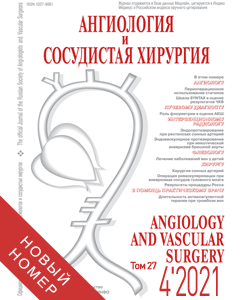Journal «Angiology and Vascular Surgery» •
2019 • VOLUME 25 • №3
Use of polytetrafluoroethylene grafts for reconstruction of major veins of mesenteric-portal system
Voskanyan S.E., Kolyshev I.Yu., Artemyev A.I., Naidenov E.V., Bashkov A.N., Shcherbin V.V., Rudakov V.S., Shabalin M.V.
Federal Medical Biophysical Centre named after A.I. Burnazyan, Federal Biomedical Agency of Russia, Moscow, Russia
Surgical management of patients with tumour invasion of major veins by means of their resection and simultaneous reconstruction is an actively developing trend in modern surgery. The article describes a clinical case report concerning treatment of a patient presenting with disseminated neuroendocrine cancer of the pancreatic head and subjected to pancreatoduodenal resection with a complicated variant of mesenteric-portal reconstruction and the use of a graft made of porous polytetrafluoroethylene, followed by relapse-free survival of more than 5 years. In our case report, despite complexity of forming a proximal anastomosis, the findings of multislice computed tomography with 3D-reconstruction 4 months after the operation demonstrated uneven circular thickening of the graft’s wall by 1-2 mm, which might be interpreted as neointimal hyperplasia. The maximum thickness amounted to 2 mm in the area of the distal anastomosis. Thus, the internal diameter of the graft varied from 8 to 9 mm. The minimum thickness was observed in the middle portion of the graft, amounting to 1 mm. The findings of computed tomography at 60 postoperative months demonstrated no evidence of the disease’s progression, the portal system of the liver contrasted evenly, the mesenteric-portal graft fully patent, showing parietally a thin uneven low-density strip 1-2 mm thick (with the maximum thickness observed in the area of anastomoses and the minimum thickness in the centre of the graft).
Thus, the obtained findings are suggestive of high efficacy, safety, and feasibility of using polytetrafluoroethylene grafts for reconstruction of major veins in clinical practice. More randomized studies are necessary to confirm our conclusions.
KEY WORDS: venous graft, porous polytetrafluoroethylene, autotransplantation of the small intestine.
P. 134
ARCHIVES MAGAZINE
2021 (Vol.27)
2020 (Vol.26)
2019 (Vol.25)
2018 (Vol.24)
2017 (Vol.23)
2016 (Vol.22)
2015 (Vol.21)
2014 (Vol.20)
2013 (Vol.19)
2012 (Vol.18)
2011 (Vol.17)
2010 (Vol.16)
2009 (Vol.15)
2008 (Vol.14)
2007 (Vol.13)
2006 (Vol.12)
2005 (Vol.11)
2004 (Vol.10)
2001 (Vol.7)
2000 (Vol.6)
1999 (Vol.5)
1998 (Vol.4)
1997 (Vol.3)


